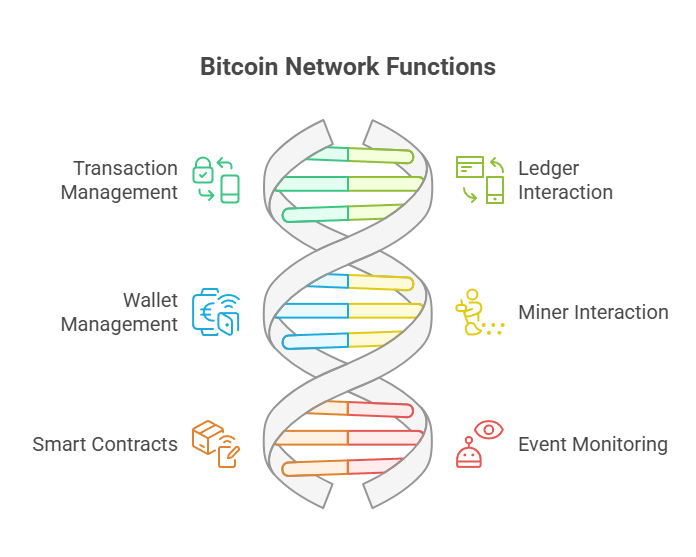Bitcoin API

Bitcoin APIs let apps and clients access the network. These APIs are needed to create DApps and other blockchain apps. They streamline intricate relationships so that developers can concentrate on application logic instead of intricate blockchain protocols.
The function of Bitcoin APIs is explained in detail below:
Purpose and Functionality

The Bitcoin network can perform a variety of tasks to Bitcoin APIs:
Transaction Management:
Through APIs, applications can propose, invoke, and query blockchain transactions [224, 230, 315, 330, 335, 497 conversation]. A node’s creation of a transaction is followed by its digital signature using the user’s private key to guarantee security and guard against manipulation. Next, the peer-to-peer (P2P) network broadcasts these transactions. Bitcoin transactions are referred to as “push” transactions because the sender starts them, which is thought to be more secure than “pull” transactions, which are started by the recipient. To encourage miners to participate, clients freely tack on transaction fees.
Ledger and Block Interaction:
To access and query the distributed ledger, developers can utilise APIs [259, 340, 497 conversation]. Bitcoin blockchain transactions are unchangeable, timestamped, and sorted. Blockchain explorers like Blockchain.com let users inspect block contents and analyse past transactions using a transaction ID or address.
Wallet and Address Management:
APIs make it easier to generate Bitcoin addresses and cryptographic key pairs (private and public keys). Sending and receiving money is made possible using API-managed wallets, which are basically private keys used for encryption. Addresses are usually represented in Base-58 format and are derived from public keys. For security and privacy concerns, it is usually advised against reusing addresses.
Miner Interaction:
Through a Proof of Work (PoW) consensus method, miners use intricate cryptographic calculations to confirm transactions and add new blocks to the blockchain in the permissionless Bitcoin network. APIs communicate with miners in this process. Bitcoins are given to miners as payment for their efforts to extend the blockchain and validate transactions.
Limited Smart Contract Capabilities:
APIs can be used to programmatically enforce financial agreements via “contracts” on the Bitcoin blockchain, even if the scripting language (Script) employed by Bitcoin itself is limited and does not provide loops to prevent unwanted effects. On systems like Ethereum, smart contracts have more sophisticated features.
Event Monitoring:
Applications may be able to listen for and keep an eye on blockchain events to APIs.
You can also read Web3.shh: Decentralized Messaging With Whisper On Ethereum
Bitcoin Clients and Tools
The Bitcoin network can be accessed using a variety of clients and tools:
- Installing the Bitcoin Core Client software on several systems is possible. Among them:
- Main service client daemon Bitcoind provides JSON-RPC.
- Bitcoin-cli: A JSON-RPC command-line utility that accesses the blockchain, submits transactions, and controls the local node with bitcoind.
- The Bitcoin Core GUI is bitcoin-qt.
- Bitcoin network node types include:
- Full nodes: These are able to publish new blocks, confirm that transactions are legitimate, and store the complete blockchain.
- Simple Payment Verification (SPV) nodes, also known as lightweight nodes, are required to forward their transactions to full nodes instead than storing or maintaining a complete copy of the blockchain.
- Alternative Clients: Full node clients for other implementations, such as btcd (written in Golang), are available.
Methods of Interaction (API Interfaces)
Bitcoin APIs are usually accessible:
- Bitcoind allows programmatic Bitcoin node communication using low-level JSON-RPC Interface. You must configure your RPC login and password in order to utilise it. You can connect with this API using command-line tools like curl.
- Available starting with Bitcoin Core client version 0.10.0 and later, the HTTP REST Interface usually operates on the same TCP port as JSON-RPC and by default does not require authentication. You may also use curl for this.
- Bitcoin APIs are available as Online Service Providers from a number of businesses, giving developers a more straightforward HTTP REST Interface. Blockchain.info, BitPay, and block.io are a few examples. Reputable exchanges with excellent APIs include Coinbase Pro and Kraken.
Programming Libraries and Languages
Programming for Bitcoin is a rich field with libraries for many languages that make it easier to build by covering the underlying API calls. Among them are:
- Pycoin is one of the Python libraries.
- Java: Bitcoinj is one of the libraries.
- Examples of C++ libraries are Libbitcoin.
- Although it isn’t specifically mentioned for Bitcoin, JavaScript libraries are frequently used to communicate with blockchain protocols and offer developers in the larger blockchain ecosystem coding tools and accessibility points.
Security and Evaluation Considerations
Security matters when evaluating Bitcoin APIs. Quality exchange APIs have clear documentation, test environments, and industry-standard security protocols like OAuth 2 or HMAC. In order to guard against misuse and Distributed Denial of Service (DDoS) attacks, which are frequent in the sector, APIs frequently use rate limitation. Furthermore, exchanges frequently apply Know Your Customer (KYC) regulations to confirm user identity, while this was not always the case in the past.
You can also read What Is Geth In Blockchain: Ethereum Node, Contracts & More
